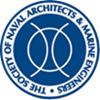Added Resistance and Speed Loss of a Ship Found Using Onboard Monitoring Data
IF 1
4区 工程技术
Q3 ENGINEERING, CIVIL
引用次数: 4
Abstract
Prediction of the added resistance or corresponding speed loss in real sea conditions is essential to evaluate the performance of a ship. Assessment of the environmental impact on vessel performance is essential for route and cargo planning, optimization of fuel consumption and design, and configuration of engines and the main propulsion system. In the present study, added resistance and speed loss in real sea conditions are evaluated from1 year of onboard monitoring data of a platform supply vessel (PSV) operating in the North Sea. The true sea margin is shown on an annual basis. Relative contributions from environmental conditions and vessel operation control are presented. Results are compared with model experiments and existing numerical methods for prediction of added resistance and speed loss in waves. The study shows that added resistance due to waves for this PSV is significantly larger than predicted by conventional frequency-domain calculations or model tests. No reason for the deviation is found, but it is anticipated that a combination of effects of longitudinal mass radius of gyration, differences in wavelength and steepness in model tests and reality, and nonlinear effects (not accounted for in the numerical calculations) is partly responsible for the deviations. For ships having similar main dimensions, the conventional ways of predicting added resistance or speed loss in waves is nonconservative, and improved methods should be sought.利用船上监测数据发现的船舶阻力和速度损失增加
预测实际海况下增加的阻力或相应的速度损失对于评估船舶性能至关重要。评估环境对船舶性能的影响对于航线和货物规划、燃料消耗和设计的优化以及发动机和主推进系统的配置至关重要。在本研究中,根据北海平台补给船(PSV)一年的船上监测数据,评估了真实海况下的附加阻力和速度损失。真实的海缘是以年度为基础显示的。介绍了环境条件和船舶运行控制的相对贡献。将结果与模型实验和现有的波浪附加阻力和速度损失的数值预测方法进行了比较。研究表明,这种PSV因波浪而增加的阻力明显大于传统频域计算或模型试验预测的阻力。没有发现偏差的原因,但预计纵向质量回转半径、模型试验和实际中波长和陡度的差异以及非线性效应(数值计算中未考虑)的影响是造成偏差的部分原因。对于主尺度相似的船舶,预测波浪中附加阻力或速度损失的传统方法是不保守的,应该寻求改进的方法。
本文章由计算机程序翻译,如有差异,请以英文原文为准。
求助全文
约1分钟内获得全文
求助全文
来源期刊

Journal of Ship Research
工程技术-工程:海洋
CiteScore
2.80
自引率
0.00%
发文量
12
审稿时长
6 months
期刊介绍:
Original and Timely technical papers addressing problems of shipyard techniques and production of merchant and naval ships appear in this quarterly publication. Since its inception, the Journal of Ship Production and Design (formerly the Journal of Ship Production) has been a forum for peer-reviewed, professionally edited papers from academic and industry sources. As such, it has influenced the worldwide development of ship production engineering as a fully qualified professional discipline. The expanded scope seeks papers in additional areas, specifically ship design, including design for production, plus other marine technology topics, such as ship operations, shipping economic, and safety. Each issue contains a well-rounded selection of technical papers relevant to marine professionals.
 求助内容:
求助内容: 应助结果提醒方式:
应助结果提醒方式:


